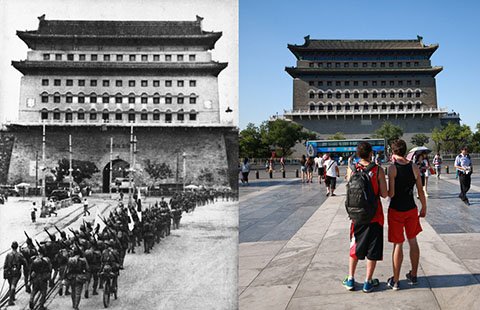'Interest in complexity'drives winning scientist
Updated: 2015-07-06 06:28
By LIA ZHU in San Francisco(China Daily USA)
|
||||||||
Christopher J. Chang — one of two Chinese Americans among the three winners of the Blavatnik National Awards for Young Scientists — has been honored for his discoveries in chemistry that span neuroscience and energy science.
The 40-year-old chemist is Class of 1942 Chair and professor of chemistry and molecular and cellular biology at the University of California, Berkeley.
"The generosity of the Blavatnik Foundation has recognized our efforts in chemistry research with societal benefit," Chang told China Daily.
"The first is to identify and understand the roles of all of the basic chemical elements that are essential for how the brain works," he said.
"It's sort of like building a Rosetta Stone for neuroscience, which you can potentially use to decipher the language of how the brain works, except from a chemistry point of view we don't even know all the letters (e.g. elements) and words (e.g. molecules) involved," he explained.
Chang said his second goal was to develop technologies for personalized energy, "where you can use solar energy to make what you need in your own household without a big energy grid, from food to fuels to pharmaceuticals to biodegradable materials, anything that will make a small difference in helping to minimize waste and climate change."
Born in Ames, Iowa, Chang was raised in Indiana and then spent some time in California. His father, from Shanghai, and mother, from Hong Kong, immigrated to the US for college.
"They have always been supportive and just wanted my life to have more opportunities than theirs with a US education," Chang said. His father, also a chemist, always wanted to know "what things were made out of".
However, chemistry wasn't Chang's first major in college. He credited undergraduate mentor Harry Gray with getting him excited about chemistry and energy science. After earning an undergraduate degree from the California Institute of Technology, he studied for one year at the Université Louis Pasteur in France on a Fulbright scholarship.
After earning a PhD at the Massachusetts Institute of Technology with Dan Nocera in renewable energy chemistry, he began applying his knowledge of inorganic chemistry to biological problems as a postdoctoral fellow in the Massachusetts Institute of Technology lab of Steve Lippard, where he developed sensors for tracking the metal zinc in cellular systems.
"I've always been interested in complexity," he said in the biography posted on his university's website. "I went to school to be an engineer, and I ended up a chemist." Part of that is because "I've always been fascinated by the brain, nature's most complex and beautiful system, and how it works."
Working at the frontiers of neuroscience and energy research, Chang focuses his research on new chemical tools for imaging and proteomics in the brain and central nervous system, as well as new molecular, biological and materials catalysts for energy conversion and solar fuels.
"Chris Chang has changed the way bio-organic and bioinorganic chemists think about the role of redox active metals and reactive oxygen species in signaling, pathology and physiology in the brain ... an emerging field known as metalloneurochemistry," said Scott E. Denmark, a chemistry professor at University of Illinois and a member of the award jury.
The Blavatnik Awards, given annually by the Blavatnik Family Foundation, honor the nation's most exceptional young scientists and engineers with a prize of $250,000 to each winner, which is considered the largest unrestricted cash award given to early career scientists.
Starting with a pool of 300 nominations from 147 universities and institutions, the jury narrowed the selection to 32 national finalists and then to three laureates. All the finalists will be honored at a ceremony on Sept. 28 at the American Museum of Natural History in New York.
The other two laureates are Edward F. Chang, a Chinese-American neurosurgeon who has done pioneering work mapping the "blueprint" of how humans speak and hear, and Syed Jafar, a computer scientist whose discoveries in interference alignment in wireless networks has changed the field's understanding of the capacity of wireless networks.
liazhu@chinadailyusa.com
- Injured ROK tourists in intensive care
- 36 dead, 26 missing after banca capsized in C. Philippines
- Thai navy plans to buy three Chinese subs
- Mass casualties in Indonesian military plane crash
- Japan's LDP lawmaker denounces Abe's security policies
- More than 100 feared dead in Indonesian military plane crash

 Then and Now: Beijing’s historic sites as witnesses of war
Then and Now: Beijing’s historic sites as witnesses of war
 In photos: China from above
In photos: China from above
 Serena Williams beats sister Venus to reach last eight
Serena Williams beats sister Venus to reach last eight
 Culture insider: Six things you may not know about Minor Heat
Culture insider: Six things you may not know about Minor Heat
 Fancy sculptures sparkle in Chongqing
Fancy sculptures sparkle in Chongqing
 Ten photos you don't wanna miss - weekend special
Ten photos you don't wanna miss - weekend special
 US beat Japan 5-2 to win Women's World Cup
US beat Japan 5-2 to win Women's World Cup
 Veterans of World War II honored
Veterans of World War II honored
Most Viewed
Editor's Picks

|

|

|

|

|

|
Today's Top News
China answers Clinton charges
President Obama addresses IS threat
China has ability to deal with risks to economy: premier
Govt prefers peaceful means in resolving maritime row: Envoy
China predicts Greece to stay in eurozone
Chinese stocks struggle to maintain rally in afternoon
Greece enters uncharted territory after referendum 'no' vote
Chinese embassy warns travelers to be careful in Turkey
US Weekly

|

|






